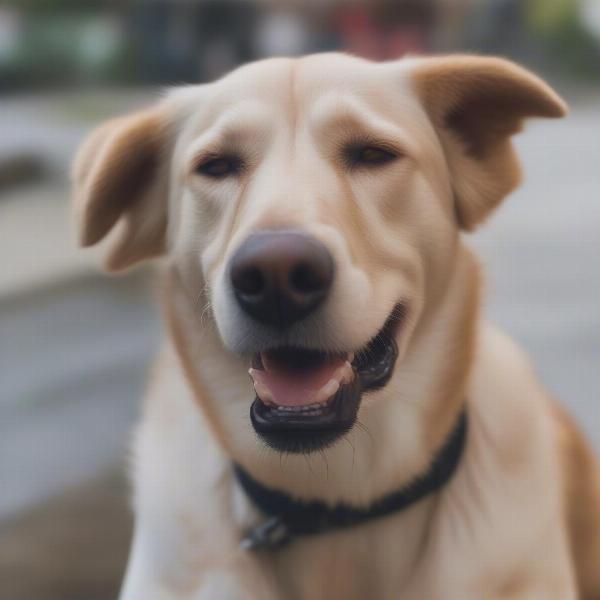Overfeeding your dog can lead to a range of problems, from mild discomfort to serious health issues. If your dog ate too much food, you’re likely feeling concerned and unsure of what steps to take. This article provides practical advice on how to handle the situation, what signs to watch out for, and how to prevent it from happening again.
Recognizing the Signs of Overeating in Dogs
 Dog showing symptoms of overeating
Dog showing symptoms of overeating
It’s important to recognize the signs that your dog has overindulged. Some common indicators include vomiting, diarrhea, lethargy, abdominal pain (evidenced by whining or restlessness), and a noticeably distended belly. In severe cases, dogs might experience difficulty breathing or collapse.
Immediate Steps to Take if Your Dog Ate Too Much Food
If you suspect your dog has overeaten, do not induce vomiting unless specifically instructed to do so by a veterinarian. This can sometimes cause more harm than good. Instead, remove any remaining food to prevent further consumption.
When to Seek Veterinary Attention
While most cases of overeating resolve on their own with supportive care, there are situations that warrant immediate veterinary attention. Contact your vet immediately if your dog is experiencing severe symptoms such as difficulty breathing, collapse, unproductive retching (trying to vomit but nothing comes up), or persistent vomiting and diarrhea. Also, be vigilant if your dog has a history of bloat, a life-threatening condition that can occur when a dog’s stomach fills with gas and twists.
Long-Term Strategies to Prevent Overeating
Preventing overeating is crucial for your dog’s long-term health and well-being. Establishing a regular feeding schedule and sticking to recommended portion sizes is essential. Avoid free-feeding, which allows your dog to graze throughout the day. Instead, offer meals at specific times. dog collar bow tie
Choosing the Right Food
Selecting a high-quality dog food that is appropriate for your dog’s age, breed, and activity level is paramount. Consult with your veterinarian for personalized recommendations. Ensure that treats are given in moderation and factored into your dog’s overall daily calorie intake. Puzzle toys and slow feeders can help to slow down a dog who eats too quickly. bow tie collar for dogs
What Happens If a Dog Eats Too Much Food?
If a dog eats too much food, they might experience digestive upset, including vomiting and diarrhea. In more severe cases, they could develop bloat, a life-threatening condition.
How Long Does it Take for a Dog to Recover from Overeating?
Most dogs recover from a single instance of overeating within 24-48 hours. However, if symptoms persist or worsen, veterinary care is necessary. presents for dog owners
Can Overeating Cause Long-Term Health Problems in Dogs?
Chronic overeating can lead to obesity, which increases the risk of various health problems, including diabetes, joint issues, and heart disease. south side dog park
Conclusion
Knowing what to do if your dog ate too much food can help prevent serious complications. Being mindful of portion sizes, feeding schedules, and choosing the right food plays a vital role in your dog’s overall health. While a single instance of overeating is usually not a cause for major concern, persistent or severe symptoms require immediate veterinary attention. By following the advice outlined in this article, you can help ensure your furry friend enjoys a long, healthy, and happy life. dog friendly holiday homes in bude
ILM Dog is a leading online resource dedicated to providing dog owners with expert advice and practical tips on all aspects of canine care, from breed selection and nutrition to training and health. We offer a wealth of information to help you provide the best possible care for your furry companion. For expert advice tailored to your dog’s unique needs, contact us at [email protected] or call us at +44 20-3965-8624. ILM Dog is your trusted partner in ensuring your dog’s well-being.